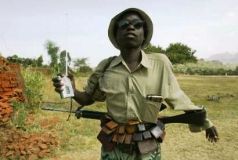Sudan’s Darfur talks seek to break deadlock on security delaying humanitarian accord
By DANIEL BALINT-KURTI, Associated Press Writer
ABUJA, Nigeria, Oct 25, 2004 (AP) — Sudan’s government and rebels met Monday to try to break a deadlock over key security issues holding up the signing of an accord to grant humanitarian organizations wider access to hundreds of thousands of refugees of the Darfur crisis.

|
|
A member of the Sudan Liberation Army ( SLA), listens to a radio at Dorsa village in west Darfur , October 10, 2004. |
The previous round of talks in Nigeria’s capital ended in failure last month after Sudan’s government and the two main rebel groups — the Sudan Liberation Army and its smaller counterpart, the Justice and Equality Movement — failed to agree on security issues.
The crisis in Sudan’s western region began in February 2003 when rebels rose up against the Arab-dominated government, claiming discrimination in the distribution of scarce resources in the large, arid region.
A sticking point in the peace talks is a government demand that the rebels disarm. The rebels insist that the pro-government militias known as Janjaweed must first be reined in and give up their weapons.
The Sudanese government has promised to allow humanitarian agencies unfettered access to areas of Darfur under its control, as stated in a draft humanitarian aid accord which guarantees similar access for aid workers in rebel-controlled areas.
The rebels say existing accords already provide for relief efforts and Janjaweed attacks make it impossible to do more to protect them.
Representatives at the talks Monday said delegates would try to agree on an agenda for the negotiations. The talks were supposed to open Thursday but were delayed because dozens of delegates failed to make flights to Nigeria.
Sudan Liberation Army spokesman Mahgoub Hussain said his group was still insisting on a wide security agreement before signing the humanitarian aid accord.
“I’m looking for security for the people in Darfur,” he said. A humanitarian accord would mean “nothing without a security protocol,” he added.
Abulrahman Zuma, press adviser to the Sudanese government and a delegate at the talks, said the government was willing to discuss security issues before signing the humanitarian accord.
“Although I should have reasons for being optimistic, I am not,” he said. “The problem is the other side — they are not united under responsible leadership.”
The United Nations has called Darfur the world’s worst humanitarian crisis and said it has claimed 70,000 lives since March, while 1.5 million have fled their homes since fighting began in February 2003.
Before the previous round of peace talks broke up, the Sudanese government had pledged unilateral adherence to an April cease-fire agreement signed in Chad.
On Sunday, European Union foreign policy chief Javier Solana, who met Sudan’s foreign minister over the weekend in Khartoum, urged the government to unilaterally sign the already drafted humanitarian protocol as a confidence-building gesture. Sudan’s Foreign Minister Mustafa Osman Ismail said the EU request would be considered and promised to cooperate with the international community.
The U.N. Security Council has said it would consider penalties such as sanctions if the Sudanese government fails to disarm all militia and restore peace.
Jan Pronk, the top U.N. envoy for Sudan, said the U.N. Security Council would meet in Nairobi, Kenya, from Nov. 18-20 to discuss the crisis.
Meanwhile, Pronk said a splinter Sudanese rebel group called the National Movement for Reformation and Development that is based around the northwestern Darfur city of Tina had launched a series of attacks this month against police, other rebel and tribal factions and Sudanese troops.
Hassan Khames Grow, one of the rebel group’s leaders, said it had split from the Justice and Equality Movement six months ago because “they have an Islamic agenda.” Speaking by phone from Darfur, Grow said his movement had 3,000-4,000 armed fighters.
“We want to solve the problem of Darfur not by big ideas, but by negotiation,” he said. “If we are not invited, we will continue to attack the government.”
Leading figures from the group were on the sidelines of the first round of Abuja talks in August, but officials dismissed them as irrelevant.
Grow warned his fighters would attack African Union peacekeepers in the area because the African Union had ignored its demand to attend peace talks.
Last week, the African Union agreed to increase its peacekeeping force in Darfur from 390 to 3,320. A senior AU official said the enhanced force should be in the region by early next month.
